Recent Storm Damage Posts
Prepare for Storms
7/9/2024 (Permalink)
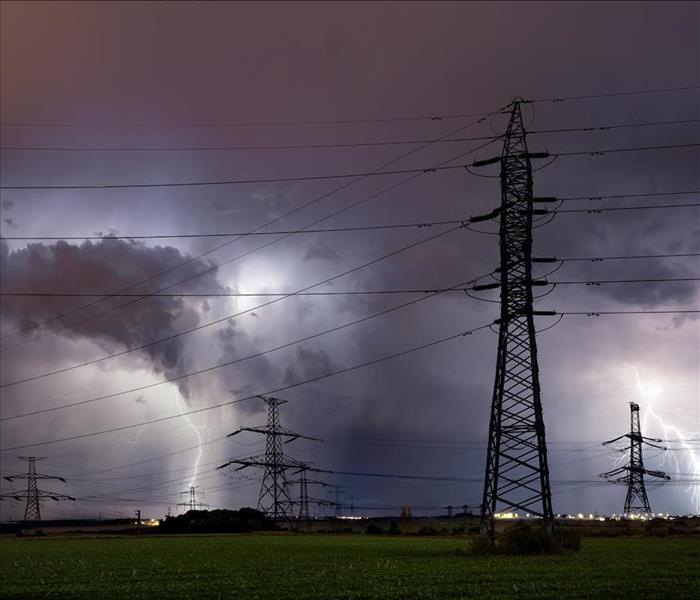 Storms can be dangerous weather events that leave destruction to your property.
Storms can be dangerous weather events that leave destruction to your property.
Storms can be dangerous weather events that leave destruction to your property as well as cause injuries. Below is a checklist to make sure your home and family are best prepared for any storms, so that you, your loved ones, and your home can stay safe.
- Prepare a Storm Shelter. Include essential supplies such as food, water, a first aid kid, flashlights, and batteries to last a few days in the case of a severe storm or tornado.
- Clear Branches and Dead Trees Around Your Home. The high-speed wind of storms can send dead branches or even trees crashing through your windows, siding and roof. Clearing these objects away from your house is an easy way to make sure they do not cause any damage.
- Secure Outside Objects. If a bad storm is coming up, move large outdoor objects inside to prevent damage to your house and those objects.
- Document Your Valuable Items. Take pictures of valuable items that you can use to show to your insurance provider. If they are damaged or lost in the storm, you’ll have better luck with your claim if you have documentation. Include date of purchase and purchase amount if you have that as well. Bonus points for saving receipts!
- Protect Your Pets. When preparing for storms, pets’ needs can be forgotten about. Make sure to have a plan in place for your pets, whether that is in your storm shelter or if that means having them in a separate safe location for when the storm hits.
Protecting Your Garden During Rainstorms
4/19/2024 (Permalink)
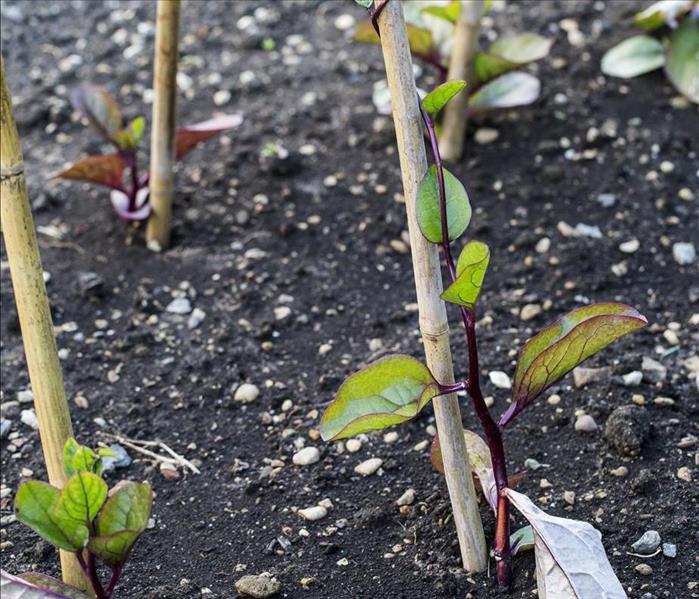 Although our gardens love a nice rain shower, too much rain can be harmful to all the plants.
Although our gardens love a nice rain shower, too much rain can be harmful to all the plants.
Although our gardens love a nice rain shower, too much rain can be harmful to all the plants. After all the hard work you have done to manage your garden, do not let heavy rainstorms ruin it! Follow these tips to protect your garden during heavy storms:
Before Rainstorm:
- Remove damaged limbs and shoots – Removing dead limbs and shoots from your plants will help make them more streamlined and will reduce snapping and tangling.
- Add compost and mulch – Adding a couple of inches of compost to the top 8 to 12 inches of soil will help with drainage.
- Support taller plants – Push wooden or metal support into the ground and tie taller plants to it. This will help keep them stable against rain and strong winds.
- Drainage – Make sure there is a proper runoff that tilts away from your garden and make sure it is not blocked. Water collecting in your garden can be damaging to your plants, possibly drowning them.
During Rainstorm:
- Cover your most delicate plants – Use a waterproof tarp to cover your most fragile plants during heavy rainstorms. Make sure that the covering is not blocking water from draining because it can cause other plants to drown.
After Rainstorm:
- Check your vegetable roots – Once the rainstorm has stopped, make sure there are no exposed roots following soil erosion. If there are exposed roots, cover them with soil or compost before they dry out.
- Check your pots and planters – Pots and planters can easily become flooded if the drainage is blocked. Check them before, during and after rainstorms. You can always cover pots and planters if necessary.
- Pull weeds up by hand – The moist soil after rain means you are much more likely to retrieve the whole root without it snapping or breaking.
Need more tips? Go to The Plant Guide for more information on maintaining your garden during severe weather.
Tips on Driving in the Rain
4/10/2024 (Permalink)
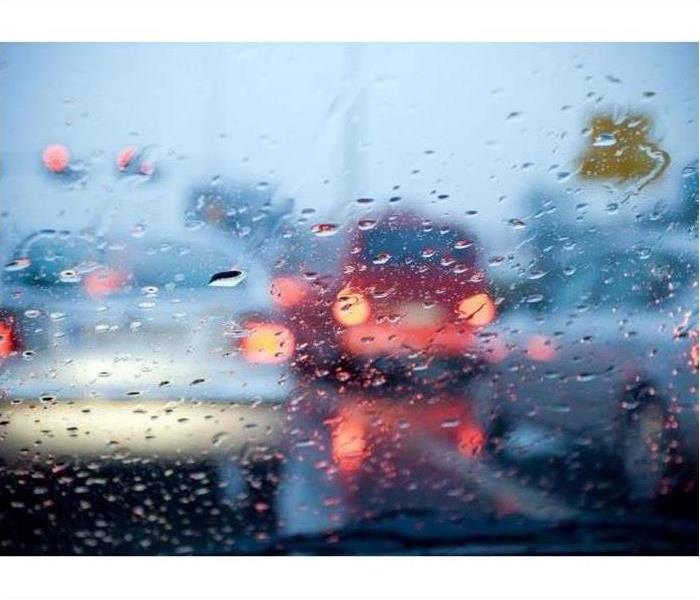 Rainy roads can be dangerous.
Rainy roads can be dangerous.
Did you know nearly half (47%) of all weather-related car accidents — more than 700,000 a year — are due to rain? Here are a few tips to help you drive safely in the rain:
- Exercise caution. Engine oil and grease build-up on roads and highways over time, and when combined with precipitation, you’ve got the equivalent of an automotive Slip ‘N Slide.
- Slow down. Wet pavement causes tires to lose traction and vehicles become more difficult to handle.
- Use headlights. Always use headlights in the rain – even if it’s just a sprinkle. Headlights help you see and be seen in wet weather.
- Keep your windshield wipers in tip-top shape. Summer can wreak havoc on your blades, so get them checked before fall’s showers arrive.
- Defog your windows. Precipitation can cause your windshield to quickly fog up, so use the front and rear defrosters to maximize visibility.
By employing these safe driving techniques, you can keep yourself and your passengers safe during spring drizzles and downpours. Rainy roads can be dangerous, but if we all slow down and use extra caution, rainy days might actually be a little brighter.
Storm Damage Services
4/1/2024 (Permalink)
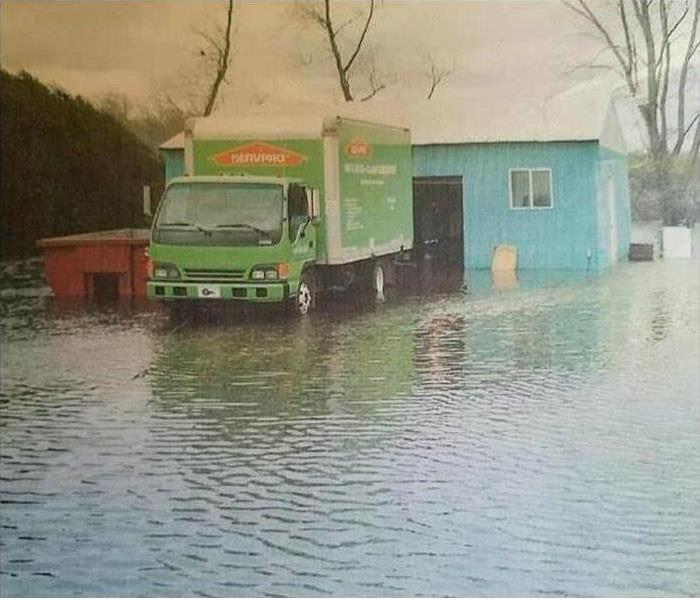 When water damage strikes, a fast response is critical.
When water damage strikes, a fast response is critical.
Severe storms can cause heavy rainfall which can lead to flooding which can lead to unwanted water damage to your business in no time. SERVPRO® wants local residents to know that when a storm damages your commercial property, our highly trained professionals will respond to cleanup and restore your property to pre-damage condition. Our ability to immediately respond to a storm emergency helps to minimize the damage and the cleaning and restoration costs.
Here are Some of the Services We Provide:
- Emergency Contact 24/7/365
- Inspection and Damage Assessment
- Water Removal and Water Extraction
- Drying and Dehumidification Services
- Cleaning and Repair
- Odor Removal
- Restoration
When water damage strikes, a fast response is critical. Day or night, business owners can expect our team to respond immediately to any storm emergency.
Flooded Basements
3/18/2024 (Permalink)
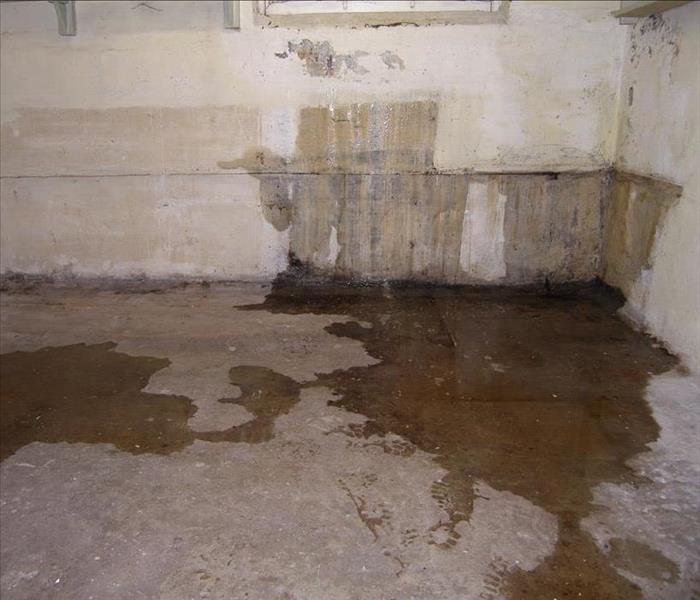 A basement can flood at any time, although flooding most often occurs during heavy rainfall.
A basement can flood at any time, although flooding most often occurs during heavy rainfall.
A basement can flood at any time, although flooding most often occurs during heavy rainfall. Basements are inherently prone to flooding because they are at the lowest level of a building and are normally built partly or entirely below ground level. There are a number of reasons why your Indiana basement could flood, including:
- A blocked or failed sewer lateral pipe
- Heavy rain causes surface water to pool around your home
- Storm sewer backup
- Sanitary sewer backup
- Foundation drainage failure
- Water supply-line break or hot-water tank failure
- And many more
If flood water is not handled quickly and properly, it can jeopardize your health and safety, and cause severe damage to your home’s structure. Remember, the longer you wait, the worse the problem will get.
The bottom line: a flooded basement can jeopardize your health, safety, and your home’s integrity. Let our trained, professional crews handle the situation safely and correctly. We have earned the trust of hundreds of homeowners, business owners, and property professionals.
Why Choose SERVPRO®
- We are available 24 hours/7 days per week
- We’re a preferred vendor to many national insurance companies
- We bill the insurance directly – one less thing for you to worry about
- Our technicians are highly trained in water restoration techniques
- We use s500 IICRC Restoration standards
- Advanced inspection and extraction equipment



 24/7 Emergency Service
24/7 Emergency Service




